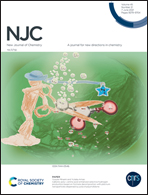PMO12@ZIF-8/ZnO-derived hierarchical porous molybdenum carbide as efficient electrocatalysts for hydrogen evolution†
Abstract
It is significant to design porous catalysts with increased active surface and reveal more catalytic sites for improving catalytic performance. In this study, MoC@NC is synthesized via a one-step carbonization procedure under Ar atmosphere. Thereinto, PMo12@ZIF-8/ZnO was prepared by the mechanical grinding of zinc oxide, 2-methyl imidazole and phosphomolybdic acid hydrate and used as a precursor. The characterization results show that MoC@NC is an N-doped hierarchical porous graphite carbon-coated MoC nanoparticle. Significantly, the formation of hierarchical pores is mainly attributed to the evaporation of zinc ions at high temperatures. The catalyst exhibits outstanding hydrogen evolution reaction (HER) property with low overpotentials (132 and 122 mV) and small Tafel slopes (75 and 80 mV dec−1) in 0.5 M H2SO4 and 1.0 M KOH solutions at a current density of 10 mA cm−2. Moreover, MoC@NC demonstrated favorable stability for 24 h under operating conditions. Herein, the excellent catalytic effect can be ascribed to the multistage pore structure and the N-doped graphite carbon layer. Simultaneously, this is a simple way to synthesize highly efficient MoC electrocatalysts in large quantities.



 Please wait while we load your content...
Please wait while we load your content...